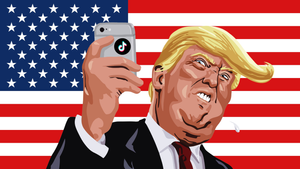As TikTok works hard to avoid being banned in the US next month, this week it has formally reached out to the two entities that could stop or at least postpone the ban: the US Supreme Court and Donald Trump.
It’s asked the Supreme Court to pause the ban that is due to kick in on 19 Jan so that judges there can properly consider what it calls a dispute of “profound significance for the entire nation”, while TikTok CEO Shou Zi Chew has met with Trump after the incoming President said he had a “soft spot” for the short form video app.
Meanwhile, in Europe, TikTok’s lawyers are now having to deal with a European Union investigation into whether it is compliant with rules in the EU’s Digital Services Act that are designed to combat disinformation.
Whereas the impending ban in the US relates to concerns about the Chinese government’s access to TikTok user data via the app’s China-based owner ByteDance, the EU is investigating whether the Russian government was able to use the social media platform to interfere in the recent Romanian elections.
The 19 Jan deadline in the US comes from a law passed earlier this year which gave ByteDance 270 days to sell TikTok otherwise it will be banned in the country. Attempts to get that sell-or-be-banned law overturned in a Washington DC appeals court on free speech grounds failed earlier this month, which is why TikTok is now taking the matter to the Supreme Court.
It wants the Supreme Court to initially pause the ban while it goes through with its next appeal. Failure to do so, it said in a legal filing on Monday, will result in the shutdown of “one of America’s most popular speech platforms the day before a presidential inauguration”.
If that happens, it added, TikTok and “countless small businesses who rely on the platform” will “suffer substantial and unrecoverable monetary and competitive harms”. Before any of that happens, the Supreme Court should have time to properly review this law and TikTok’s arguments against it, because “this case raises novel constitutional questions of profound significance for the entire nation”.
Plus there’s no real danger in delaying things, TikTok argued. Because, despite the law seeking to allay national security concerns regarding China, there isn’t actually any “imminent threat to national security”, it claimed. After all, US Congress and Joe Biden’s government have only ever said that the Chinese government could access TikTok user-data, not that it actually does.
Many of these arguments were also presented in the DC appeals court, without success. Judges there not only declined to overturn the sell-or-be-banned law, but also refused to postpone the 19 Jan deadline. It remains to be seen what position the Supreme Court judges now take.
But given the uncertainty there, it’s no surprise that TikTok is also schmoozing incoming president Trump, who tried to ban TikTok himself during his first presidency, but who has nevertheless voiced opposition to the sell-or-be-banned law, vowing to “save TikTok” during this year’s US election.
Asked about it all during a press conference on Monday, he told reporters, “I have a warm spot in my heart for TikTok”, mainly because he believes the social media app played a role in increasing the number of young American voters who backed him in this year’s big vote when compared to the 2020 election. As a result, he added, his new government will “take a look at TikTok”.
Trump takes office the day after the ban is due to go into effect and, under the sell-or-be-banned law, he could immediately extend the deadline by 90 days.
That said, there are plenty of people in his new government who see the threat of China as a top concern, so it’s not clear if he’ll work to overturn the law entirely. Though that’s presumably what Chew was pushing for when he met with Trump at his Mar-a-Lago estate in Florida on Monday.
Over in Europe, the EU is investigating claims that the Russian government instigated a disinformation campaign via TikTok in order to influence voting in the recent presidential election in Romania, where right wing politician Calin Georgescu - whose policies on Ukraine in particular would be seen as more favourable by Russia - unexpectedly topped the first round of voting.
The second-round of voting was cancelled because of allegations about a TikTok-based disinformation campaign supporting Georgescu.
The EU will investigate whether TikTok complied with its obligations under the Digital Services Act to combat disinformation being published on its platform. TikTok insists it did, but European Commission President Ursula von der Leyen says it’s important to investigate further because “we must protect our democracies from any kind of foreign interference”.
“Following serious indications that foreign actors interfered in the Romanian presidential elections by using TikTok”, she added, “we are now thoroughly investigating whether TikTok has violated the Digital Services Act by failing to tackle such risks”.
So, lots to keep TikTok’s lawyers busy into the new year, even if it does end up being removed from app stores in the US on 19 Jan.

